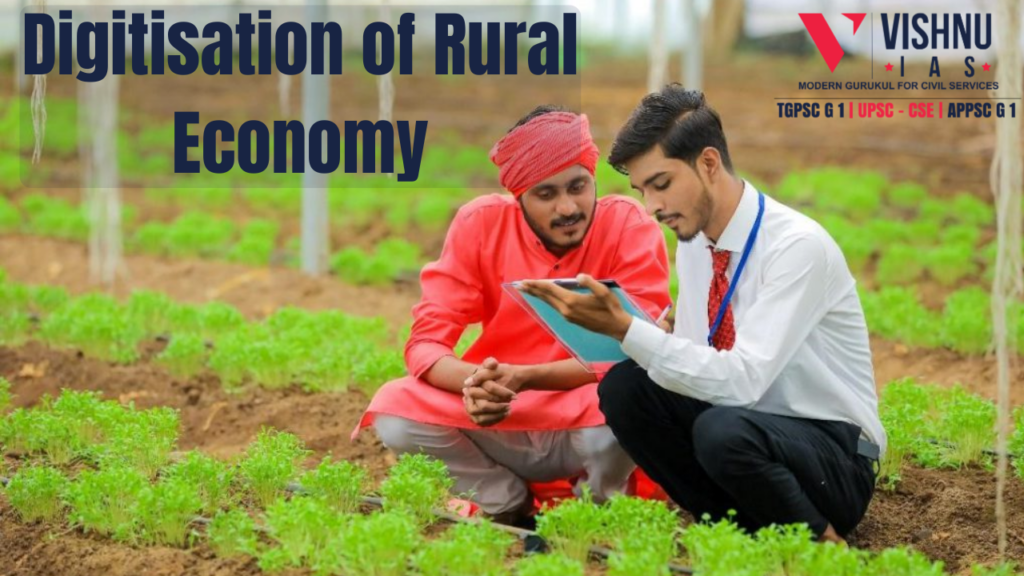Digitisation of Rural Economy
Approach
- Introduction: Brief introductory lines about the Digitisation of rural economy
- Body: Add the comprehensive analysis by adding few govt schemes
- Conclusion: Add its contemporary relevance
INTRODUCTION
The digitization of the rural economy is highly relevant and significant in today’s context, especially considering the rapid advancements in technology and the increasing need for sustainable development.
BODY
Here are some key points highlighting its present relevance and significance:
Economic Empowerment
- Market Access: Digital platforms enable rural producers to access broader markets, increasing their income potential and reducing dependency on middlemen.
- Financial Inclusion: Mobile banking and digital payment systems provide rural populations with access to financial services, fostering economic growth.
Agricultural Advancements
- Precision Farming: Technologies like IoT, drones, and AI help farmers optimize resource use, improve crop yields, and reduce environmental impact.
- Supply Chain Efficiency: Blockchain and other digital tools enhance transparency and efficiency in the agricultural supply chain, reducing losses and ensuring fair prices.
Social Development
- Education: E-learning platforms make quality education accessible to rural students, bridging the educational gap between urban and rural areas
- Healthcare: Telemedicine services provide rural residents with access to medical consultations and health information, improving overall health outcomes
Infrastructure and Connectivity
- Internet Access: Expanding internet infrastructure is crucial for enabling digital services in rural areas, promoting connectivity and information flow.
- Digital Literacy: Training programs are essential to equip rural populations with the skills needed to effectively use digital tools.
Challenges and Considerations
- Digital Divide: Ensuring equitable access to digital technologies remains a significant challenge, with disparities in infrastructure and digital literacy.
- Sustainable Implementation: Effective implementation requires collaboration between government, private sector, and local communities to ensure sustainable and inclusive growth.
Case Studies and Examples
- India: Initiatives like Digital India and eNAM (National Agriculture Market) are transforming rural economies by providing digital infrastructure and market access.
- China: The rural digital economy is a key driver of rural revitalization, with significant investments in digital infrastructure and services.
Anthropology Full Course at Vishnu IAS Academy
What does Course Offer?
- 4 Months (250+ Class Hours)
- Online (App + Web) / Offline / Hybrid Mode of Classes
- Live + Recorded Videos Access For 1 Year
- 2 Hour Live Class From Monday to Saturday (1.5 Hours for Class + ½ Hour for Doubt Solving)
- Foundation to Advanced Level of Teaching
- Simple and Integrated Content
- One Stop Solution Books
- Regular Value Added Content
- Current Affairs & Case Studies Modules
- Daily Answer Writing Practice
- Weekly Grand Tests On Sundays & Evaluation With Guidance and Topper Will be Rewarded
- 500+ Model Answers
- 9 AM – 9 PM Support System
- Free GS Current Affairs
- Free Interview Guidance for Anthropology
Here at Vishnu IAS, we provide a comprehensive coverage of Complete Anthropology Syllabus For UPSC Preparation so that students function with the clarity needed to navigate the course of optional preparation for scoring 300+ marks.


